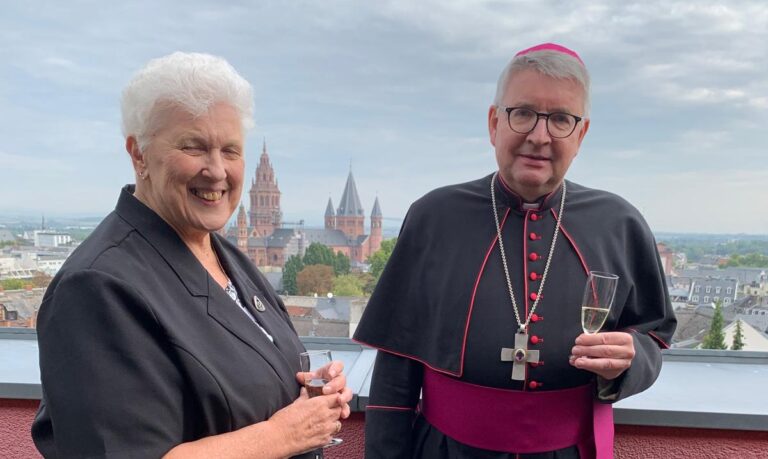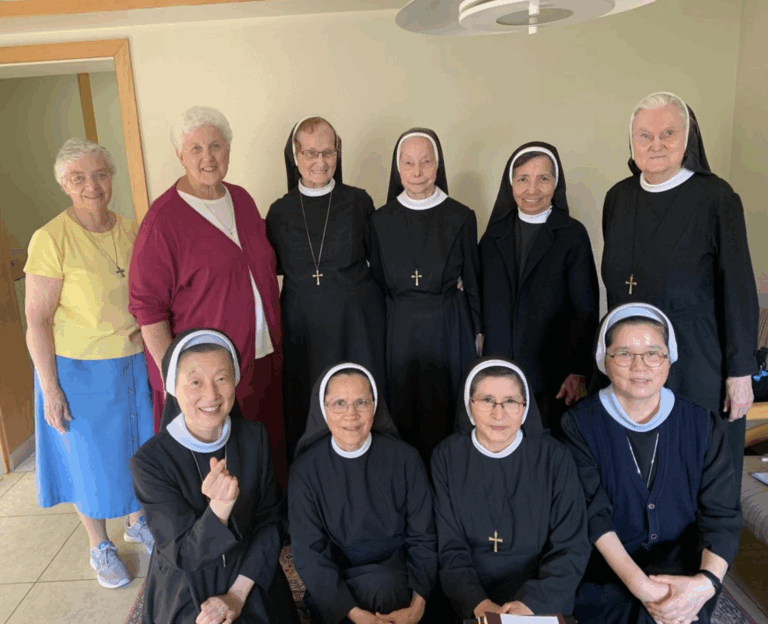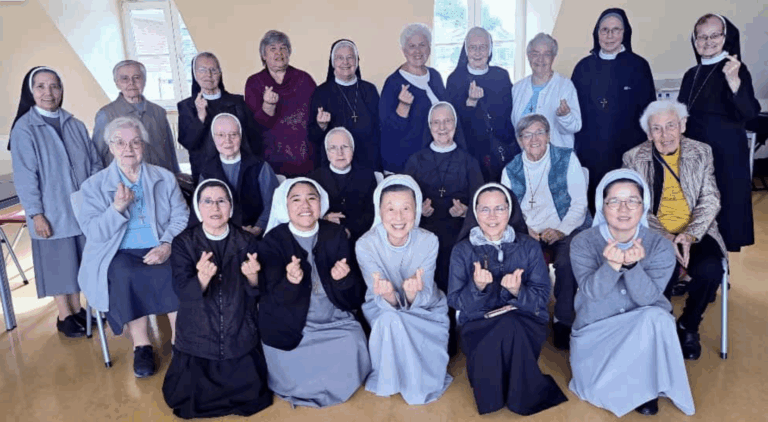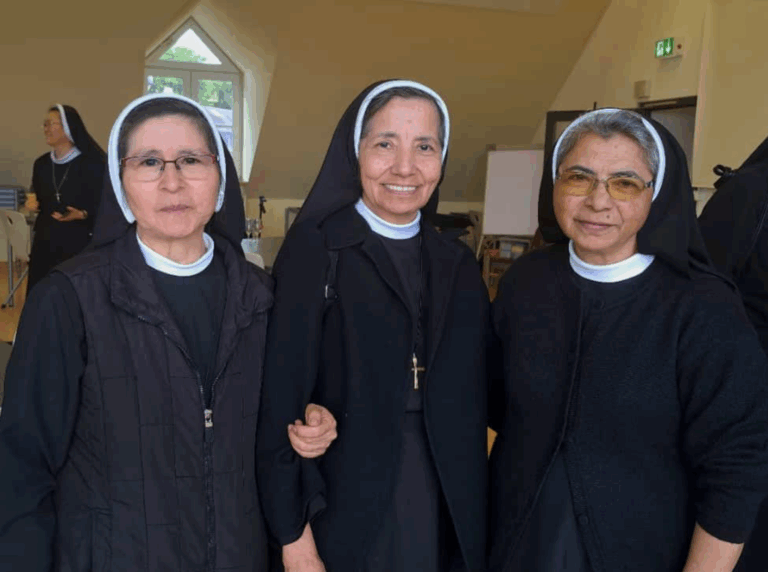Declaration of the Sisters of Divine Providence

As Sisters of Divine Providence
As Sisters of Divine Providence, an international congregation of religious women, we are called to make God’s providence visible in our world. Rooted in trust in God’s faithful care, we commit ourselves to live at the margins of society, at the thresholds of struggle, and in places of exclusion and hope.
To follow Providence means to reject all forms of exclusion and discrimination, and to stand with comfort and compassion beside those who are rejected or silenced. These places of vulnerability and courage are sacred ground where God’s Spirit is already at work.
At the margins, we give and receive equally. Through encounters, we are transformed by the wisdom, strength, and love of our sisters and brothers, and we discover Providence alive in every person and every community.
We commit ourselves to advocacy, accompaniment, and solidarity, working toward a world in which no one is excluded and every person is valued as a beloved child of Providence.
Homily for the Founding Feast of the Sisters of Divine Providence
Monday, September 29, 2025, 9:00 a.m.
The spoken word applies.
In the middle of the 19th century, Bishop Wilhelm Emmanuel von Ketteler founded the Congregation of the Sisters of Divine Providence. To this day, they live here at their place of foundation in Mainz-Finthen. As bishop, I look with gratitude together with you upon the decades of your faithful service in the following of Jesus. For today and for the future, even in times when so much is changing, we may continue to trust in God’s Providence.
The Sisters have been and still are active in many areas — for children and young people, in schools and education, and in many forms of pastoral care. The Sisters are close to the people.
As bishop, I can learn from you how to trust in God’s Providence. He continues to guide the Church even in these days. In a prayer from the General Chapter of 1995, which I read on your website, it says:
WE PRAISE YOU, O LORD, FOR YOUR PROVIDENCE AND WE TRUST IN YOUR LOVING CARE
with praise and thanksgiving for all the good and beauty we have received,
with confidence when we face our limits,
with surrender to your mysterious divine will in suffering and disappointment.
WE LIVE BY YOUR PROVIDENCE; HELP US TO MAKE IT TRANSPARENT IN OUR WORLD
through faithfulness, by living as responsible stewards of the earth and of our personal gifts,
through courage, by committing ourselves to goodness and justice in our time,
through compassion, by making the joys and sorrows of your people our own,
through hope, by working together with people of goodwill in building your Kingdom.
I can pray this prayer well for our diocese. Following Jesus does not mean life is always sunshine. But Christians may live in trust that God will not abandon His Church. Discipleship requires courage. It requires compassion as a Christian attitude. It requires hope — the hope that something in this world can be changed. That is what you stand for today.
Your community has lived this for decades and continues to do so. The key themes of your congregation are also the themes of the Church and of the society in which we live today. From the beginning, your community has been close to the pulse of the times — to the joys and hopes, the questions and concerns of the people. Much has changed over the years; the world has become a different one.
As a Church, we should not retreat into a shell and let the world simply be the world. We should understand ourselves as part of this world, while remembering that we have a strong foundation in faith in God. In the text above, you express the Christian principle of representation. Where others no longer believe or hope, you live that faith and hope. In this way, you live out our Christian mission as a whole.
Divine Providence does not mean that everything happens automatically. Yes, God has a plan for this world and for each individual person. But it takes people who lend Him their hands and feet, their mouths, hearts, and minds. The original idea of your order also included compassion for the people of the time. This required knowing the reality of people’s lives — but also looking to Christ, the incarnate and crucified Lord. Whoever looks to Him learns compassion — and through that, society is transformed.
In Münster, in the Church of St. Ludgeri, one can see a crucified Christ — a particularly striking image. This crucified figure has no arms. In World War II, the statue lost both arms in a bombing raid. When one prays before this cross, it is deeply moving. Normally, one sees the arms of Christ outstretched, as if drawing us close, touching and embracing all people. But this Christ cannot do that.
Beneath this cross stands a prayer from the 14th century:
Christ has no hands but our hands to do His work today.
He has no feet but our feet to lead people on His way.
Christ has no lips but our lips to tell people of Him.
He has no help but our help to bring people to His side.
Of course, this text can be misunderstood — God always has more power and possibilities than our human ones. But let us look closely at the Gospels: Jesus gives His disciples the mission to make the Kingdom of God, His work, present in the world. Just as He carried the cross out of love. He does not want to act without us. We are His hands that do good, His feet that bring the Gospel to others, His lips through which He proclaims the Good News. Christ is powerless if we refuse Him and fail to make Him tangible.
You, dear Sisters, have been making Him tangible for many decades.
To remain sensitive to suffering and compassionate toward people, prayer is essential. And on your website, you give beautiful witness to this:
Common prayer is a central part of our daily life as religious Sisters and an expression of our faith. In these moments, we turn ourselves anew toward God and people. The Liturgy of the Hours, prayed together at specific times of day, holds a special place. Lauds in the morning and Vespers in the evening form the anchor points of our prayer life.
In the rhythm of creation and in the prayer of the Church, we find comfort and connection. Millions of believers around the world are united through prayer — an experience that moves and inspires deeply. As we pray and meditate on the Psalms, we contemplate our own existence from God’s perspective and draw new strength for daily life.
Prayer is more than a religious exercise — it is our connection to God, a source of community, and a renewal of our spirit. In silence or togetherness, shared prayer gives comfort, strength, and hope for each day.
This prayer, too, is an act of representation. Many people cannot or no longer wish to pray. You carry them with you in your prayer. I am deeply grateful for your presence in our diocese.
How do you envision the Church? Smaller — or more international? On your website, you emphasize community across all borders. That is a richness you bring to our diocese and live out worldwide. As a global Church, we enrich and strengthen one another. Sometimes we must also bear and shape the differences of cultures and expressions of faith.
You live out this ministry of representation and example. I thank you for your service, your faith, your community, and your prayer. It is wonderful that you live here, yet also widen your gaze and boundaries. For all that lies ahead, I wish you sincerely God’s blessing.




